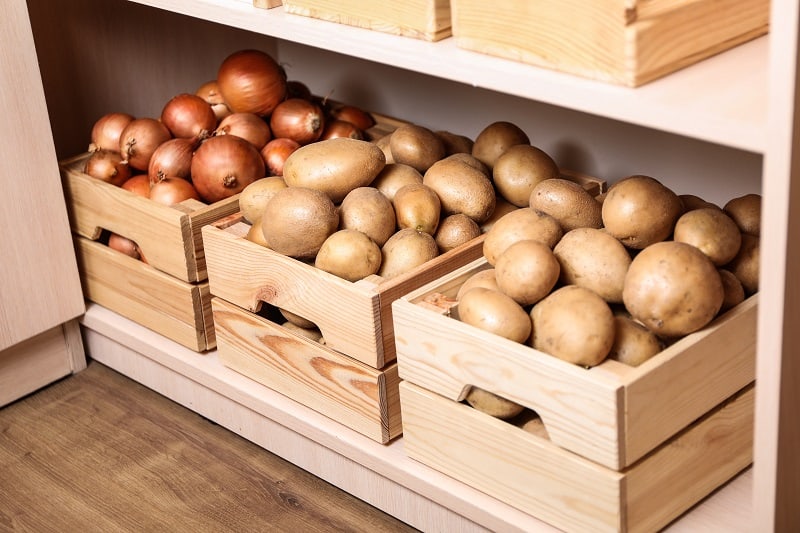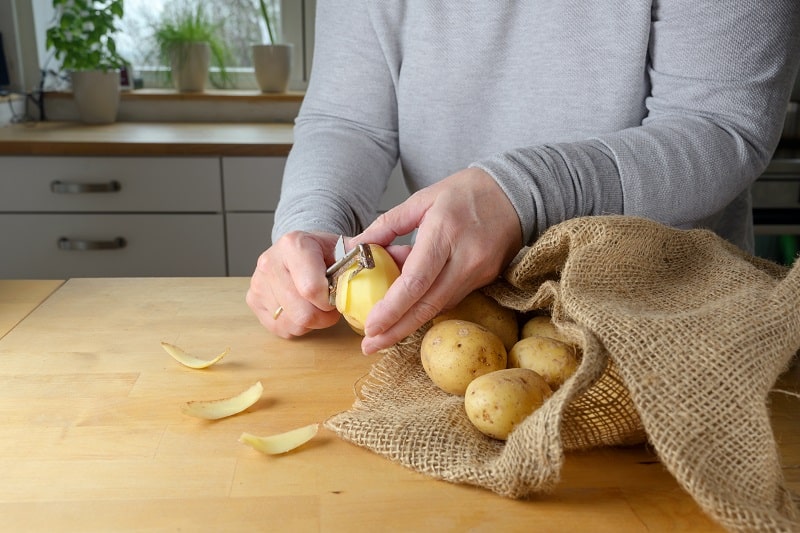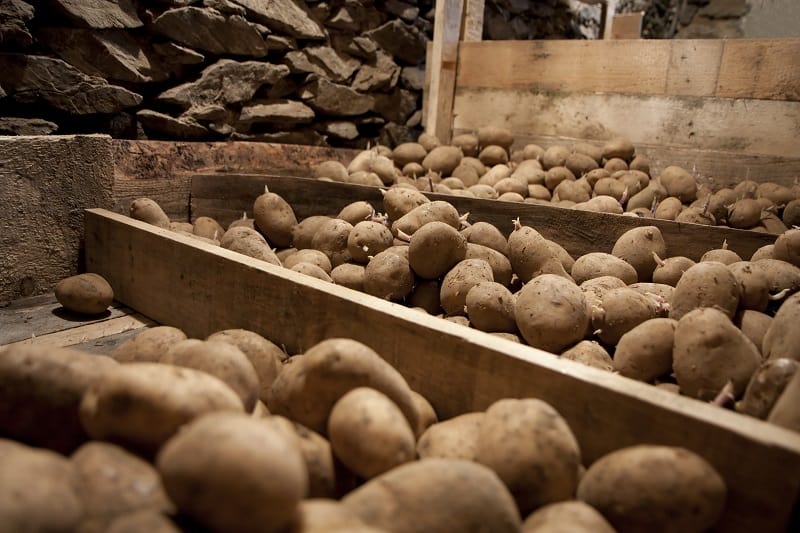
Potatoes stay fresh longer than many other fruits and veggies, but at some point, even a potato will shrivel and rot if not stored correctly. However, if you know how to store potatoes properly, they can stay fresh and edible for months to come.
How to store potatoes? Potatoes should be stored in a cool, dark, and dry place like a ventilated basement, garage, or a root cellar. To prevent rotting and sprouting you should keep your potatoes in a cardboard box, basket, or a paper bag. Potatoes can also be blanched and stored in a freezer or dehydrated into flakes.
Keep on reading to find out more ways to store potatoes at home and additional tips on how to keep your potato harvest fresh for several months.
What is the Best Way to Store Potatoes at Home?

Compared to other veggies potatoes can stay fresh for several months when stored properly. Knowing how to store potatoes is essential if you want to preserve your harvest or avoid buying potatoes every other day.
The best way to keep potatoes fresh is to store them in a cool, dark, and dry place. Potatoes should be kept at temperatures between 35-40 F in a root cellar or basement where they can stay fresh and edible for four to six months.
How to Store Your Potatoes?
The great thing about potatoes is that they are very easy to store. With the right storage methods, your potatoes can stay fresh the entire winter season.
Here’s how to do it:
- After buying potatoes from grocery stores or gathering your harvest, take some time and inspect all potatoes for damages, mold, soft spots, and sprouts. Sift through and pick only healthy and normal potatoes for long-term storage.
- Place healthy potatoes into a cardboard box, paper bag, basket, or a mesh bag to allow them to breathe. Note, tubers kept in plastic bags have a shorter shelf life, so never leave potatoes in a bag after a trip to a grocery store.
- Store your potatoes in a cool, dry, and dark place at a temperature below 50 F. A garage, basement, shed, or a root cellar is the best option as long as it’s cool, dark, and dry. Since cold temperature turns potato starch into sugar, a fridge is never a good place to store potatoes.
- Once your potatoes are in storage, check them every few weeks and remove soft, shriveled, or rotten potatoes before they cause more potatoes to rot. And even if some of your potatoes have sprouted, they are still safe to eat as long as they are firm.
Other Ways to Store Potatoes

People have stored potatoes for many centuries, so naturally, there is more than one way you can do it. Below, you’ll find several different storing options and you can pick the one that works the best for you.
Root Cellar Storage
The most convenient way to store potatoes is to place them in a root cellar where they won’t be at risk of freezing or sprouting. Considering that most cellars are dry and dark, you can rest assured that your potatoes will stay fresh and edible even after a few months.
However, if you don’t have a root cellar, an insulated garage or a basement can be a good alternative for storing potatoes for the winter.
Rebury Potatoes Outdoors
Another great way to store potatoes is to rebury them in the ground right after the harvest. This preservation technique is a good choice if you don’t have any extra storage space, or you just want to conserve your potatoes till late fall.
To rebury potatoes, you’ll need to dig six inches deep, broad trenches, and place the tubers on the bottom. Cover potatoes with soil and straw or several layers of newspapers to keep them protected from moisture and rain.
Slice and Blanch Potatoes for Freezer Storage
If you have some extra space in your freezer, you can certainly utilize it to store potatoes. Not only will potatoes always be within an easy reach, but frozen potatoes last long and can be stored for a full year.
To prepare your potatoes for a freezer you’ll first have to peel and put them in cold water ensuring that they are completely submerged. Next, you’ll need to cut the potatoes so that all pieces are of a similar size.
Rinse the potatoes for a second time before dropping them in boiling water to blanch for three to five minutes. When the time is up, remove blanched potatoes from the pot and put them in a bowl of cold water.
Once potatoes are completely cool, drain and put them in a freezer bag and store them in a freezer.
Pressure Can Potatoes
While it may seem a bit intimidating at first, pressure canning is a great way to store potatoes. To start, you’ll need to peel the potatoes and blanch them in a pot of boiling water for three to five minutes.
Once blanched, drain and rinse the potatoes before adding them and boiling water to mason jars. Leave an inch of headspace from the rim, place the lids on the jars and pressure can everything at 10 pounds of pressure for 40 minutes.
Dehydrate for Potato Flakes
If you have a lot of potatoes and not enough room to store them, you should consider dehydrating them into potato flakes. Start by washing and peeling potatoes and then leave them to cook completely.
Once the water is cold, use a mixer to blend everything together into a smooth mush. With a spoon set the potato mush onto the dehydrator pan and set it to 140 F. Once the flakes are completely dried, grind them and store in an airtight container and use later to make mashed potatoes.
Additional Storage Tips
Although potatoes store easily, there are a few tips that can help you keep your harvest fresh for months to come. Here are a few:
- Don’t wash potatoes before storing them since moisture makes them more susceptible to rot. If your potatoes are completely covered in dirt, let them dry completely and then use a brush to remove big clumps of mud.
- Cure homegrown potatoes before storing them in a garage or root cellar. Cured potatoes will develop thick and dry skin which means that they are less likely to rot.
- Store your potatoes away from other fruits and vegetables. Both potato and onion release ethylene gas that encourages potatoes to sprout and ripen early, so you shouldn’t store them together.
- Don’t store potatoes in sunlit places since when exposed to light potatoes turn green and may look withered.
How long can I store potatoes?
Depending on a storing method you choose, you can store potatoes for several months or a full year. When properly stored, potatoes can stay fresh from four to six months in a root cellar, or you can blanch and keep them stored in a freezer for more than a year.
Conclusion
Whether you have bought more than you can eat or are growing potatoes, there are many ways you can store them at home. Compared to other produce, potatoes store easily and can stay fresh for several months with proper storing techniques.
Regardless of where you decide to store your potatoes, make sure that they are kept in a dark, dry, and cool place like a garage or a root cellar. And to ensure that you’ll have fresh potatoes throughout winter, check your stores from time to time and remove any rotten, shriveled, or spoiled potatoes.
Recommended Reading:

